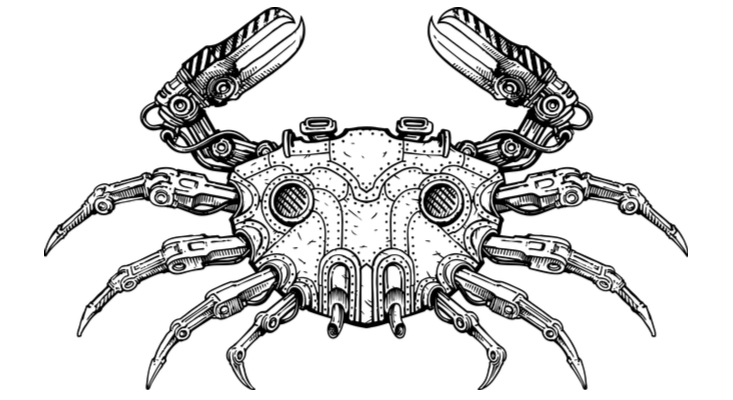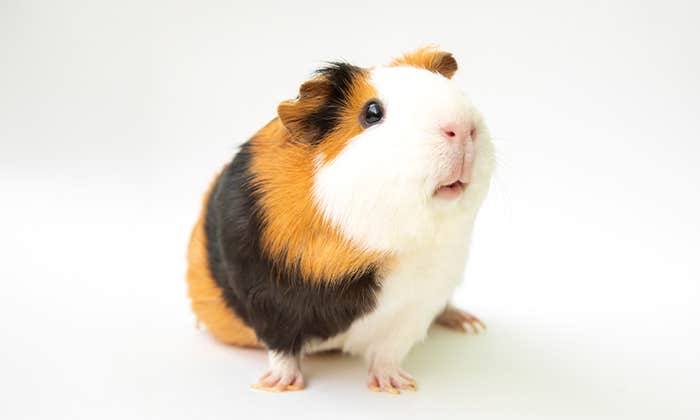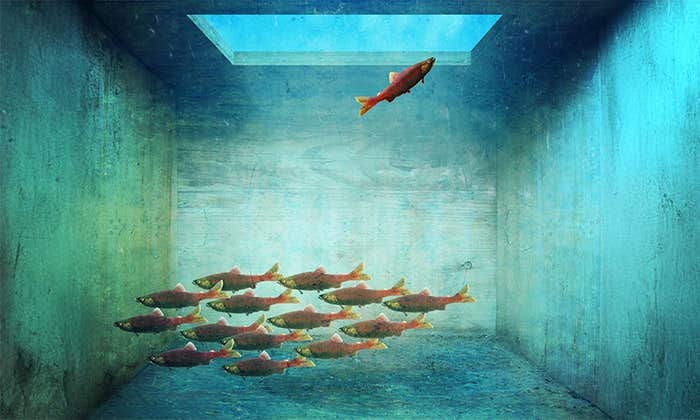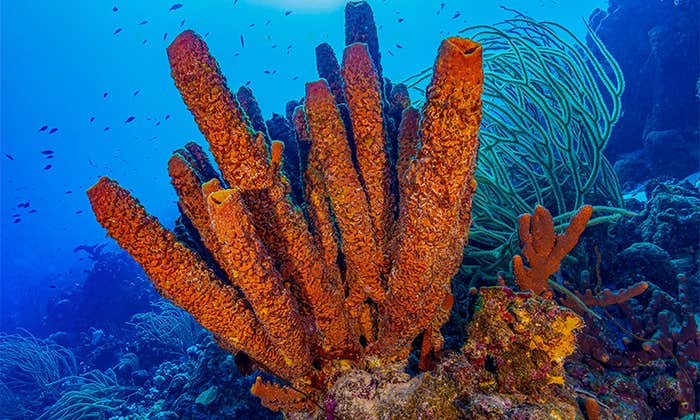I could stridently insist that natural selection is the only way that complex life can evolve, but that’s not strictly true. We can already design computers that can learn and reason and—almost—convince an observer that their behavior might be human. It’s not unreasonable that in 100 or 200 years, our computer systems will be effectively sentient: human-like robots, similar to Star Trek’s Commander Data. Alien civilizations that are considerably more advanced than us are likely already capable of such creations. The possibility—likelihood, even—of such robotic life has implications for our predictions about life on alien planets.
If, as some astrobiologists believe, alien life is likely to be artificial—i.e. “manufactured”—would the rules and constraints on life as we know it, stemming from the laws of physics and chemistry and biology, still apply? Or perhaps there are different rules, and different constraints, when life is the product of clear, intentional design?

Natural selection seems, at first glance, to be so frustratingly inefficient. Generation after generation of baby gazelles are born, destined to be eaten by lions. Only by chance is one baby born with longer legs, able to run faster, and so escape being eaten. Of course, the very beauty of natural selection is that it doesn’t require any foresight; natural selection explains life in the universe precisely because there is no presumption of any prior knowledge. No Creator is necessary, because the evolutionary process is guaranteed to proceed even without any predefined rules. Life evolves—albeit slowly—without having to know where it’s going.
But what if it were all different? What would life look like if it did know where it was going?
The 1950s physicist Anatoly Dneprov wrote quirky and characteristically Soviet science fiction. His novel Crabs on the Island tells the story of two engineers conducting an experiment in cybernetics on a deserted island. A single self-replicating robot (a “crab”) is released, and forages for the raw materials to build other robots. Soon the island is overrun with baby robot crabs. But the crabs begin to mutate. Some are larger than others, and ruthlessly cannibalize the smaller robots for spare parts to build even larger robots. How would such an experiment end? Catastrophically, of course, as is consistent with the genre, with robot crabs spreading exponentially across the entire island.
What if I have a plan for how my offspring should look and behave, and I don’t want to leave anything to chance?
Science fiction can be terribly pessimistic, but that pessimism is unfounded. Other factors are at play. Resources are limited. Eventually, even the crabs on the island run out of materials with which to make new robots. Admittedly, humans have caused tremendous damage to our own planet, but we’ve hardly destroyed the universe. In fact, there’s no indication in the night sky that any organism, biological or artificial, has spread its influence as far and wide as we might expect if they were growing exponentially like robot crabs.
But we must also be cautious with our optimism. We rely on the age-old processes of natural selection to keep reproducing robot crabs in check; something will evolve to eat them. But what if these were intelligent organisms, plotting a way to find new resources, discovering new ways to improve themselves, their evolutionary fitness, and their ability to learn from each other and from previous generations? Could such an army of replicating artificial intelligences be possible? If so, could they be stopped? How realistic is it that alien planets may be inhabited by artificial creatures so advanced that they can bypass natural selection itself? And if that is possible, why has such a creature never evolved naturally? If we want to know whether or not we should fear alien artificial intelligence, first we have to understand what’s so special about it.
It has probably not escaped your attention that the kind of intelligent transmission of experience from one generation to the next—together with the ability to know when to use that information—is not unlike what we see in human society in the cultural transmission of ideas from generation to generation. We don’t need genetics to learn about science, we just need a school. More importantly, we don’t need to follow a religion or a political ideology indefinitely and unchallengingly, we can detect when it’s not serving our needs and change our direction. Cultural transmission of experiences is a process with spookily Lamarckian characteristics. It was the Enlightenment French biologist Jean-Baptiste Lamarck (1744–1829), who, in the century before Darwin, attempted to explain the fact that animals appear to be remarkably well adapted to their environment and had a number of ideas how this might happen, the best known of which was his two-pronged laws of inheritance—that animals develop traits that they use repeatedly, lose traits they don’t use, and pass on acquired traits to their offspring.
We do indeed inherit a tendency to certain cultural ideas from our parents and from society, but we can mold them to our best advantage, alter them, or even discard them. You might be brought up by parents who are wonderful musicians, but you decide that you never even want to touch a kazoo. Cultural ideas that are used are reinforced, those that are neglected waste away. It is precisely this ability to improve and to prune ideas that has caused human civilization to advance at such breakneck speed. And if this kind of cultural transmission does occur on another planet, you can be sure that evolution will be swift and effective—just as ours continues to be.
Let us do a brief thought experiment. Imagine that you are a member of a highly advanced alien civilization, intent on spreading your legacy throughout the galaxy. You come to an uninhabited planet with the intention of “seeding” it. But instead of dropping off a biological molecule, you might be such an advanced alien that you seed this planet with intelligent artificial creatures, specially designed robots that have the capacity to bypass natural selection. They are programmed to have the foresight that nature is lacking. Their robotic gazelle descendants would know that longer legs are better and would re-engineer their own design to give them longer legs. Similarly, robotic lions would reprogram their own software to enable them to sneak up on prey more stealthily.
Science fiction can be terribly pessimistic, but that pessimism is unfounded.
What would be the end result of such a scenario? Would there still be predators and prey? Or would these creatures be improving themselves so rapidly that soon the robot gazelles are building spaceships to escape the robot lions and the robot lions are building supercomputers to design weapons of mass robot-gazelle destruction? This ridiculous scenario is not nearly as trivial as it seems, because the idea touches on some of the most fundamental mechanisms and constraints on evolution. Can intelligence, and the ability to bypass natural selection, also bypass the limits that the natural world imposes?
On the face of it, many of the familiar characteristics of animals and plants that we see around us would simply disappear if the organisms in an ecosystem were all super artificial intelligences. Oxford professor Nick Bostrom, for instance, suggests that a community of artificial intelligences will be sharing information in such an effective and rigid way that many aspects of animal behavior would be unnecessary. Large antlers, peacock feathers, colourful flowers, even birdsong—why bother with such peculiar and inefficient ways of communicating simple messages like “I’m here and I’m strong”? Artificial organisms could achieve the same result simply by sending an email. And if the system is well designed, checks will ensure that the email is a form of honest signalling. No fake Tinder profiles allowed.
How likely is it that this universe of interconnected computers would be doing nothing but communicating, reproducing, and carrying out their singular goal? Possibly not very. If such an alien world of artificially intelligent organisms really exists, there are some things it cannot avoid—no matter how intelligent or how well designed. On the one hand, artificial intelligence cannot improve without change, and change brings the risk of mutation. On the other hand, even the cleverest strategy is potentially open to exploitation—game theory cannot be discounted, even by a computer of sci-fi-level superintelligence.
In life (that is, natural organisms like us), mutations occur because the universe has an element of randomness to it. A stray cosmic ray knocks an electron from an atom, and the copying of your DNA is disrupted. Each cell gets a faithful copy of your DNA, and if it doesn’t, the result is often cancerous. However, not all mutations are necessarily this bad. A mutation that causes your neck bones to grow for a bit longer as an embryo may or may not be beneficial to the adult-you, but probably won’t kill embryo-you. Variation in individual organisms inevitably arises through mutations (and also—on Earth at least—through sex).
All of this is very straightforward when considering natural selection, no one knows in advance which features of an organism are beneficial and which features are harmful. Without that foresight, the only way to try out different variants is through random but small mutations and alterations on the theme that already exists.
But what if I know what I want? What if I have a plan for how my offspring should look and behave, and I don’t want to leave anything to chance?
Once created, surely AI will take over the universe?
Consider an artificial intelligence (or even a biological organism) that creates a set of self-replicating intelligent robotic probes to fly off and explore (and colonize) the universe. Each probe will land on a different planet and begin to create new probes like itself, much like Dneprov’s Crabs on the Island. Will each daughter probe be identical to the parent? Probably not. The parent probe may choose to make them slightly different from one another, with intelligent foresight: One may be optimized for swimming underwater, and one for flying in the air, for example. But will there be any errors, any mutations in the process? It would seem that, like any respectable engineer, the parent probe would make every effort to ensure that each replicated probe is exactly the way it was meant to be. The advantage of evolutionary mutation exists only because evolution has no foresight! If you do have foresight, it makes sense to dispense with the randomness.
But even if you can be 100 percent accurate, and are capable of completely stopping bugs from creeping into your software (our hypothetical parent is super intelligent, after all), we have seen that variation is, nonetheless, necessary. Even if you don’t want mutations, you need a swimming daughter probe and a flying daughter probe. The offspring of each of those daughters will also change: one granddaughter probe for swimming in deep water and one for shallow water, for instance. As time goes on and the environment on the planet changes, a wide diversity of artificial creatures will arise. Not through the mechanisms we are familiar with on Earth, but diverse nonetheless. Each one will be perfectly engineered to its niche, without the awkward wisdom teeth and appendixes that we carry with us, and that betray our origins as creatures not designed by anyone.
Even if natural selection isn’t operating on this well-oiled and super-intelligent community, some of the rules of evolution will still apply, no matter how flexible and self-designed they might be. Even super-intelligent artificial life forms are subject to the ruthlessly inevitable restrictions imposed on them by game theory—they would, after all, be competing against other super-intelligent organisms like themselves. If exploitation pays, exploitation will happen. Selfishness is a threat that will be present even in a community of super-intelligent artificial aliens. And some things like mutation, and even death, can’t be eliminated just by being incredibly smart. Even for a radical, technological, non-Darwinian life form, so many of the principles that we use to understand the evolution of life on Earth, like trade-offs, still apply, and so it is unlikely that they would design themselves to live forever.
If astrobiologists wonder why we haven’t found any indication of alien life so far, we should be doubly confused as to why we haven’t found any indication of alien super-life. Once created, surely AI will take over the universe? Well, it hasn’t happened yet, so perhaps the risk is less than we thought. And what about artificial life forms that are more modest in their abilities? Could a planet evolve an entire ecosystem all by itself, based on artificial life forms that accelerate evolution by having at least a basic Lamarckian ability, passing their lifetime experiences on to their offspring? It’s possible that, because environments can rapidly change, such organisms may not have such an advantage over natural selection after all, at least not until they can evolve the ability to communicate, cooperate, and plan their evolutionary strategies intentionally. If you are an alien species seeding a planet with some prototypical artificial organism, maybe it’s better to seed it with Darwinian creatures, rather than Lamarckians.
It’s possible that we, ourselves, are artificial creatures, seeded onto planet Earth by intelligent aliens billions of years ago. But there is no sign of this, no fingerprint of alien interference. We might as well have evolved naturally—we show all the signs of natural selection pure and simple, with no trace of Lamarckian acceleration.
Unless …
We actually do have the ability to adapt our evolution, to spread the ideas and experiences of our lifetime both to our own offspring and to others. We have Lamarckian abilities through our culture and through our technology, and what is more, we have the intelligence to know how and when to use them—although it remains to be seen whether we will be intelligent enough to be able to find our way out of the environmental dead end into which our expanding consumption has led us. Using modern techniques of genetic engineering, we can even alter the contents of our genes, eliminate the susceptibility to disease, and perhaps even stop aging. Eventually we may be able to change the shape of our very development, growing an extra arm, or wheels, or whatever takes our fancy.
Perhaps our alien seeders knew that consciousness would evolve. Perhaps this was the grand plan the whole time: Lamarckian artificial organisms could not survive their early evolutionary stages, but would one day mature. Our creators knew this and were patient enough to wait for the day when that would happen. This is possibly an unlikely scenario, but it does leave open the possibility that alien planets will be inhabited by “artificial” life forms that are nonetheless indistinguishable from what we would expect from natural selection.
Read our interview with Arik Kershenbaum here.
Arik Kershenbaum is a zoologist college lecturer, and fellow at Girton College, University of Cambridge. He is a member of the international board of advisors for METI.org, a think tank on the topic of messaging extraterrestrial intelligence.
From The Zoologist’s Guide To The Galaxy by Arik Kershenbaum. Published by arrangement with Penguin Press, a member of Penguin Random House LLC. Copyright © Arik Kershenbaum, 2021.
Lead image: WinWin artlab / Shutterstock


























